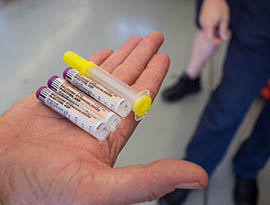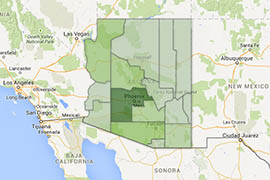- Slug: Opiate Antagonists,400
- Photos and Google Fusion map available below
By SAMANTHA INCORVAIA
Cronkite News
PHOENIX – When a person overdoses on heroin or an opiate-based painkiller, life or death can hinge on how quickly a first responder or doctor administers drugs known as opiate antagonists.
Such drugs trigger immediate withdrawal and combat oxygen deprivation that results when the overdose slows or stops the person’s breathing.
Rep. Heather Carter, R-Cave Creek, wants to expand the number of first responders allowed to administer opiate antagonists such as naloxone hydrochloride, which is distributed under the brand name Narcan. At present, paramedics and advanced- and intermediate-level emergency medical technicians can administer the drugs.
“We’re trying to save lives,” she said.
Carter, chairwoman of the House Health Committee, authored HB 2489, which would allow peace officers and basic-level emergency medical technicians to carry and administer opiate antagonists. The measure would apply to first responders acting under a standing order from a licensed physician.
The Arizona Department of Health Services would be required to develop a training module for EMTs and peace officers on identifying opiate-related drug overdoses and using opiate antagonists.
Physicians who issue standing orders for first responders to administer the drugs as well as EMTs and peace officers would be immune from professional or criminal liability except in cases of wanton or wilful neglect.
As of December, 26 states and the District of Columbia had made similar changes to their laws, according to a document provided by Carter’s office.
“We (the House Health Committee) thought it would be appropriate for Arizona to join those groups of states,” Carter said.
Haley Coles, a founding member of Sonoran PreventionWorks, a group that educates the public about overdose prevention, said she supports the proposed change.
“I think getting naloxone into as many hands as possible is a really good way to start combatting this overdose epidemic,” she said.
Phoenix Fire Department Capt. Bryan Willingham, who worked as a paramedic for 20 years, said he’s never seen a negative reaction from Narcan.
“It works every time,” he said. “We use it regularly because opiates are so rampant in our community.”
Carter’s bill had yet to be assigned to a committee.
^___=

Capt. Robb Anders, a paramedic with the Tempe Fire Department, holds vials of Narcan, the brand name of naloxone. When administered to people who have overdosed on opiates, Narcan triggers immediate withdrawal and can save their lives. (Cronkite News Photo by Lauren Loftus)

Rep. Heather Carter, R-Cave Creek, wants to expand the number of first responders allowed to administer opiate antagonists such as naloxone hydrochloride, which is distributed under the brand name Narcan. (Cronkite News Photo by Samantha Incorvaia)

A Cronkite News analysis of public records from the 2009-2013 Arizona Hospital Discharge Data Set, which is gathered by the Arizona Department of Health Services’ Bureau of Public Health Statistics, shows there were more than 2,000 heroin overdoses reported in Arizona during that period. Click the map to review cases by county during that period. (By Samantha Incorvaia)